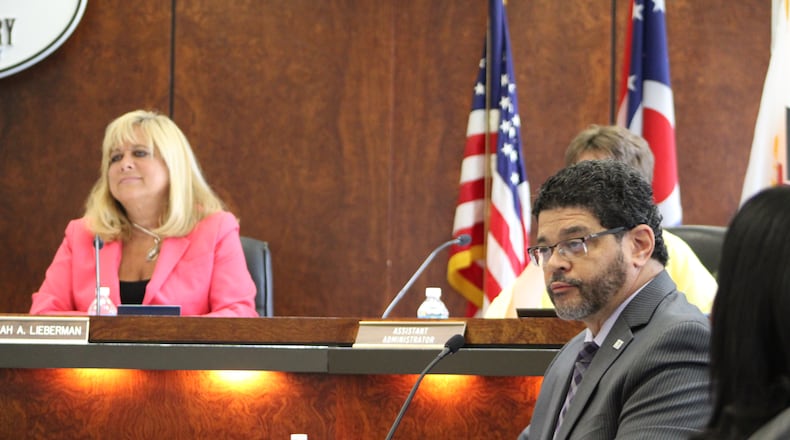The county and the United Way of the Greater Dayton Area have worked closely to identify what they say are the most pressing community needs and develop a new approach to facilitate cooperation between providers to get results.
The partners wanted “a better framework for how we could then bring the health and human services community together so there’s not as much isolated work around isolated clients,” said Tom Kelley, assistant Montgomery County administrator and director of Montgomery County Job & Family Services.
But some groups that previously received funding were dismayed to learn their programs were denied contracts. Leaders with the YWCA Dayton said they were disappointed that the county and the United Way are no longer funding their domestic violence hotline.
“I’m here today really to express some concern about the denial of the funding for the domestic violence hotline, which is the entry-point for the shelter,” said Jacqueline Gamblin, a member of the YWCA Dayton’s Board of Directors, at the county commission meeting.
MORE: YWCA Dayton raises $13M to renovate housing units, domestic violence shelter
On Tuesday, county commissioners approved four dozen contracts for services and programs designed to tackle some of the biggest social and economic issues facing the community.
Commissioners funded services and projects intended to improve food access in east and west Dayton, stabilize families and households, better protect victims of domestic violence, enhance after-school programming and help students with literacy.
Other contracts will fund hunger relief projects including daily lunches, and dental and legal services for the needy. Some funds will pay to house and shelter the homeless, develop young people, deliver meals to people with mobility issues and transport and assist seniors and frail and elderly residents.
The commission’s approval was the final step in a long process that dates back to 2014, when the United Way and the Montgomery County Family & Children First Council and Human Services Levy Council worked together to assess community needs. They identified three main priority areas: education and life skills, income and stability and health and safety.
EARLIER: Changes coming to human services delivery, funding
YWCA Dayton was pleased to receive funding for its domestic violence shelter, but it is troubling that the domestic violence hotline was not funded, officials with the organization said.
The hotline has existed for 40 years — and the county helped fund it for the last decade – and nearly all of the clients who seek services at the shelter come via the hotline, which is staffed 24 hours a day, 365 days a year, Gamblin said.
County officials said the county will continue to support hotline services, except it will be through the Artemis Center. YWCA leaders said it makes no sense to have Artemis answer emergency calls when their organization will have to be contacted anyway to help women and families in crisis.
The group that reviewed the applications for funding considered competing proposals for services and wanted organizations to team up and coordinate services to avoid duplication and redundancy, and the county and United Way stressed that funding priorities have changed, Kelley said.
This is the first time the county has used a model that strongly pushed local agencies and providers to team up for projects and to serve residents, but the strategy should deliver better human services, said Montgomery County Commissioner Dan Foley.
“I just want to say, on behalf of the commission, we support the process,” Foley said. “We believe we did the right thing by trying to do a different model.”
Commissioners said they have received calls from a variety of agencies because the selection process and choosing which projects to fund and not fund is difficult.
The county and United Way relied on experts to help recommend services to fund, and a decision was made to not fund two call centers, said Commissioner Debbie Lieberman.
“I think this was one of those decisions that was very difficult — if there was more funding, than yeah — but that’s what it is,” she said.
About the Author
